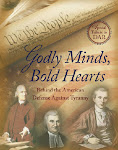March 17, 460 AD, is the day St. Patrick died, and the Irish continue to honor his memory on that date each year. As the Irish people spread out around the world, so, too, did the religious holiday of St. Patrick's Day as a time for spiritual renewal and the offering of prayers for missionaries worldwide before the serious celebrating begins. What do we know about this Saint Patrick so revered?
At age 16, Patrick was carried off into captivity by Irish marauders and sold as a slave to a druidical high priest named Milchu in a territory of the present county of Antrim in Ireland. For several years the young boy tended sheep, learned the Celtic tongue, and became familiar with the pagan practices of druidism. He relates in his "Confessio" that during his captivity while tending the flocks he prayed as much as a hundred prayers in a single day so that his faith grew and the Spirit was fervent within.
"The love of God and his fear grew in me more and more, as did the faith, and my soul was rosed, so that, in a single day, I have said as many as a hundred prayers and in the night, nearly the same." "I prayed in the woods and on the mountain, even before dawn. I felt no hurt from the snow or ice or rain."It was on a special night that he received a dream which instructed him to escape his captors by going toward the Coast. The next day he was able to leave without notice and, after traveling west some 200 miles, he found sailers who took him back to Britain to reunite with his kinsmen.
It wasn't long in his homeland before he had another dream about Ireland which begged him as a holy youth to come and walk once again upon their soil.
This dream shook him up much so that he began studies for the priesthood with the people of Ireland in mind. After years of study, he was ordained by St. Germanus, the Bishop of Auxerre, and was sent to take the Gospel to Ireland. Though the people there vehemently resisted this new message at first, it is told that a chieftain of one of the tribes was struck with the inability to move his arm until he listened kindly to what Patrick had to say.
Patrick was allowed the freedom to preach the Gospel throughout Ireland for the next 40 years, all the while in poverty and enduring much suffering, and yet able to perform miracles to show God's power.
Most of what we know about Patrick is from his 'Confessio' (spiritual autobiography) and from his 'Epistola' (denunciation of British mistreatment toward Irish Christians).
The English referred to the druids as 'snakes' because many of them adopted snakes as personal symbols to signify wisdom and cunning. Saint Patrick attempted to do away with those traditions, and that is where the myth about Saint Patrick chasing all snakes out of Ireland came from.
Familiar with Celtic cultural practices, Patrick was effectively able to combine their traditions with ideas of Christianity in order to ease them gradually toward Christian beliefs. He used their tradition of worship with fire by celebrating Easter with bonfires. He took the symbol of the sun they loved and put it on the Christian cross to create today's Celtic cross. From Saint Patrick came the idea to use the shamrock in explanation of the Trinity.
Entire kingdoms were converted, churches were built, and new believers came on board to help preach the Gospel to Ireland.
For all this, Patrick remained thankful in heart to our Creator as he described himself as a "most humble-minded man, pouring forth a continuous paean of thanks to his Maker for having chosen him as the instrument whereby multitudes who had worshipped idols and unclean things had become the people of God."
See The Examiner
Note: The first parade celebration took place in the United States when Irish soldiers serving in the English military marched through New York City in 1762. The music gave the soldiers a sentimental journey to reconnect with their Irish roots.
"It is a curious contradiction, not very often remembered in England, that for many generations the private soldiers of the British Army were largely Irish." Cecil Woodham-Smith
"We have always found the Irish a bit odd. They refuse to be English." Winston Churchill
"There is, for whatever reason, an international tendency to be well-disposed towards Ireland - a tendency that elevates us beyond our actual standing on the world stage." Ivana Bacik, Irish barrister and Labour Party candidate
A bit o'fun
An Irishman, an Englishman and a beautiful girl are riding together in a train, with the beautiful girl in the middle.The train goes through a tunnel and it gets completely dark. Suddenly there is a kissing sound and then a slap!
The train comes out of the tunnel. The woman and the Irishman are sitting there looking perplexed. The Englishman is bent over holding his face which is red from an apparent slap.
The Englishman is thinking "Damn it, that Mick must have tried to kiss the girl, she thought it was me and slapped me."
The girl is thinking, "That Englishman must have moved to kiss me, and kissed the Irishman instead and got slapped."
The Irishman is thinking, "If this train goes through another tunnel, I could make another kissing sound and slap that Englishman again!
Thank you Patrick Dennis for submission.
"Whisky was invented so the Irish wouldn't rule the world."
"If wars were fought with words Ireland WOULD BE ruling the world!"
"Well, it takes all kinds of men to build a railroad."
"No sir, just us Irish."
- Railroad barons in "Dodge City," Warner Bros., 1939
"Well, it takes all kinds of men to build a railroad."
"No sir, just us Irish."
- Railroad barons in "Dodge City," Warner Bros., 1939
"I am a drinker with a writing problem."
"When I told the people of Northern Ireland that I was an atheist, a woman in the audience stood up and said, 'Yes, but is it the God of the Catholics or the God of the Protestants in whom you don't believe?" - Quentin Crisp
"When I told the people of Northern Ireland that I was an atheist, a woman in the audience stood up and said, 'Yes, but is it the God of the Catholics or the God of the Protestants in whom you don't believe?" - Quentin Crisp






















































































No comments:
Post a Comment